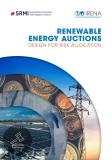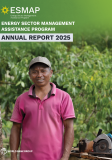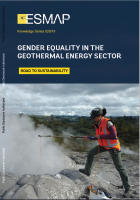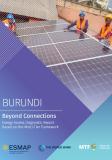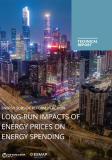Publications
Geothermal energy is globally recognized as a clean and reliable source of heat and electric power supply. The environmental and social risks posed by geothermal energy projects share common features with those of mining and extractive projects, as well as other large-scale energy infrastructure projects. Because men and women can be affected differently by such risks, geothermal projects may inadvertently lead to adverse outcomes that disproportionately disadvantage women. However, analysis of such discrepancies is often hindered by the lack of sex-disaggregated data collection and analysis of the socioeconomic, environmental, and health risks of projects and access to benefits. The World Bank recognizes the risk that ignoring gender gaps poses to geothermal projects’ effectiveness, efficiency, and sustainability.
This report is a primer on advancing gender equality in the geothermal energy sector. Based on good practices and lessons learned, it introduces ways that geothermal projects can mitigate risks and pursue opportunities to address gender gaps within the project cycle. It outlines the risks and opportunities associated with (i) changes in land and natural resource use, (ii) changes to employment and economic patterns, and (iii) changes to environment and health. Beyond mapping risks and opportunities, the report makes the case for focusing on the gaps between men and women from the project outset. Once gaps, key stakeholder risks, and additional development opportunities have been identified, project teams have an opportunity to address them through actions. For example, project developers could signal intolerance for harassment and gender-based violence through amending existing human resource policies to include codes of conduct and a Grievance Redress Mechanism with safe and ethical reporting. Other actions may include promoting inclusive procurement practices by tracking how many bidders and awardees are women-headed firms and setting up a mechanism to provide bid-readiness support for women majority–owned firms and small businesses. It is recommended that projects include specific monitoring and evaluation indicators in the results framework that measure progress toward closing gaps between men and women. In addition, the report contains an overview of guidance and toolkits developed, selected global case studies, and other resources so that project teams, governments, and geothermal developers have additional guidance on hand to prepare more equitable projects.
Fridriksson,Thrainn; Schomer, Inka Ivette; and Janik, Vanessa Lopes. 2019. Gender Equality in the Geothermal Energy Sector: Road to Sustainability. ESMAP Knowledge Series 028/19. World Bank, Washington, DC. © World Bank. https://openknowledge.worldbank.org/handle/10986/31607 License: CC BY 3.0 IGO.
